Posted on: 30 April 2021
Innovation is for everyone
An uneven playing field
Hello, my name is Liz.
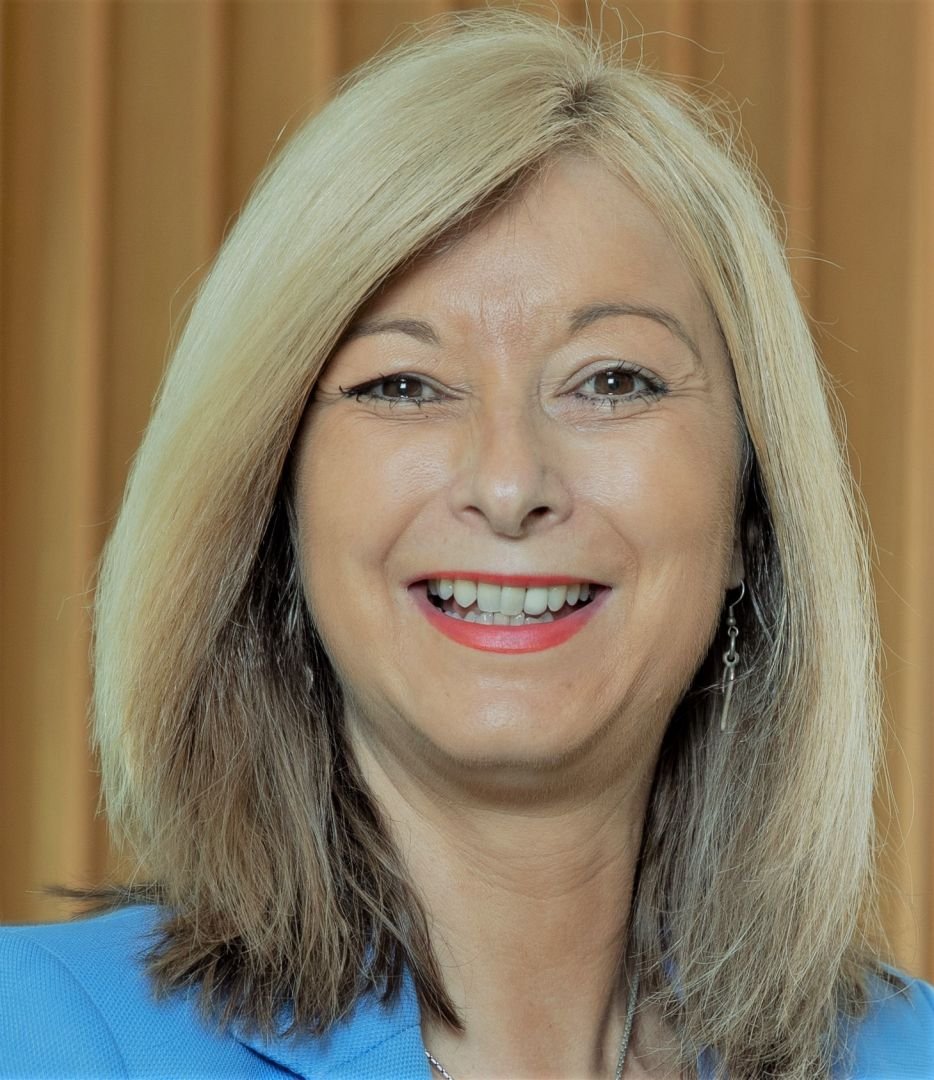
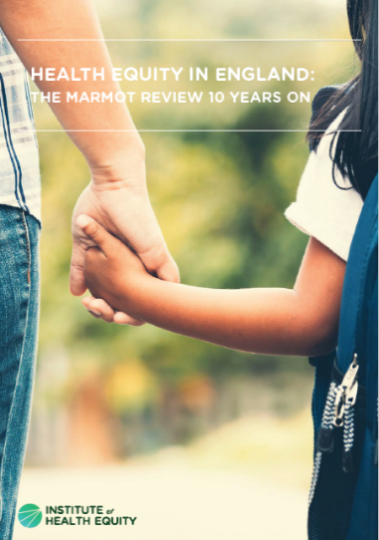 In February 2020, just as the world reported its first cases of COVID-19, The Health Foundation published ‘Health equity in England: The Marmot Review 10 years on’. It revealed that life expectancy had stalled and the health gap had grown between wealthy and deprived areas.
In February 2020, just as the world reported its first cases of COVID-19, The Health Foundation published ‘Health equity in England: The Marmot Review 10 years on’. It revealed that life expectancy had stalled and the health gap had grown between wealthy and deprived areas.
We already knew that health inextricably links to wealth and that the deprivation gap between the South and the North of England is unacceptable. A strong, inclusive economy offers people good employment opportunities, which in turn help support and sustain good health. Likewise, good health leads to better productivity and therefore economic growth.
The challenges are significant. Across West Yorkshire and Harrogate, around one in five of the 2.7 million residents live in the 10 per cent most deprived areas of the country. Alongside this comes digital exclusion.
Last year in Leeds, for example, Healthwatch found that around 90,000 adults were without essential digital skills and 50,000 were not online at all. Neither were 40 per cent of council housing tenants.
Dealing with the pandemic inadvertently exacerbated this so-called ‘digital divide’ as so many health and care services moved online. If we thought digital inclusion was important before 2020, it has now shot to the top of our national, regional and local agendas.
The mother of invention
Yet the speed with which health and care services adapted to cope with the challenges of the pandemic was remarkable. We’ve seen amazing new levels of collaboration across organisational boundaries, creative thinking and fast adoption of digital and technological solutions. It’s shown us all that innovation isn’t something irrelevant happening in a remote laboratory somewhere that might one day mean something worthwhile. Innovation is happening now, in the workplace and it’s helping save lives.
![Man using smartphone for GP consultation [stock image]](/application/files/1716/1977/2742/smartphone_gp_consultation-stockimage.jpg) The sharp rise in the use of technology in the NHS has included remote hospital and primary care appointments. Digital tools, such as wearable devices producing vital, live information – or data - have helped people manage their conditions at home. Millions of GP appointments have taken place via phone and video calls, text messages have provided important information to service users, and office-based work moved online.
The sharp rise in the use of technology in the NHS has included remote hospital and primary care appointments. Digital tools, such as wearable devices producing vital, live information – or data - have helped people manage their conditions at home. Millions of GP appointments have taken place via phone and video calls, text messages have provided important information to service users, and office-based work moved online.
These approaches can help people better manage their own health and health conditions, while relieving the pressure on, and the costs of, our precious health and care services.
This has started to catalyse the much-needed transformation from the healthcare model we’ve been working in since the NHS launched in 1948.
Leave no one behind
![teatowel [stock image]](/application/files/5816/1977/2741/teatowel-stockimage.jpg) But how do we capture and evolve what has been learnt while ensuring an appropriate blend in how we provide care and, at the same time, reduce inequalities? And importantly, how do we evaluate that along the way? While technology will improve efficiency, it must be deployed appropriately, for the user.
But how do we capture and evolve what has been learnt while ensuring an appropriate blend in how we provide care and, at the same time, reduce inequalities? And importantly, how do we evaluate that along the way? While technology will improve efficiency, it must be deployed appropriately, for the user.
In my former role as Chief Executive of the Innovation Agency, we rolled out a large number of highly technical and highly effective innovations. Conversely, one of the successful innovations we deployed was a tea towel, printed with advice on how to avoid falls.
One of our local councils introduced the idea. The towels were cheap to print and were deployed to an older population. Evaluation showed that, with supporting publicity and advice from appropriate agencies, this simple intervention reduced falls and kept people well.
Former NHS Confederation CEO Mike Farrar this month offered an interesting 12 top tips focusing on the technical, cultural, sustainable and equitable considerations for digital adoption. Beneath each are, of course, a lot of hard work and a willingness by all to embrace challenge and change.
Strengthening integration to improve care, as with our health and care partnership, must go hand-in-hand with unifying our health and care data, says Health Research UK CEO, Caroline Cake. It’s how we’ll make potentially life-saving advancements but it must be done in a transparent way and in an ‘ecosystem of trust’.
Our partnership is part of the award-winning Yorkshire and Humber Care Record, which is making great strides towards this, so that health and care staff has better and faster access to vital information and the public can be active participants in managing their own health and wellbeing.
Embrace the learning curve
Citizen inclusion and equal access to services depends on a workforce which is skilled in digital technology and understands how to overcome barriers to inclusion.
As with the digital divide, if developing skills in digital technology was considered important before 2020, it is now urgent. Education is the key to overcoming what is perhaps the biggest barrier to adopting digital technology in health and care.
In 2019, The Topol Review forecast that
- within 20 years, 90 per cent of all jobs in the NHS will require some element of digital skills
- all staff will need digital and genomics literacy
- people will be empowered to participate more fully in their own care, and
- to succeed, we must invest in people as well as technology.
In response, health and care education, training and settings are evolving to embrace these challenges.
![Man pointing to data on computer screen [stock image]](/application/files/6816/1977/2740/point_to_the_data-stockimage.jpg) Last year, Calderdale and Huddersfield NHS Foundation Trust in a joint bid with Bradford Teaching Hospitals NHS Foundation Trust were among the first 27 NHS trusts joining the NHSX Digital Aspirants programme. Another 32 additional Trusts joined last month, each receiving up to £6 million to help deliver their digital ambitions. Two more of our NHS Trusts (Airedale, Harrogate and District) were among this batch who received funding to develop their plans to join the programme.
Last year, Calderdale and Huddersfield NHS Foundation Trust in a joint bid with Bradford Teaching Hospitals NHS Foundation Trust were among the first 27 NHS trusts joining the NHSX Digital Aspirants programme. Another 32 additional Trusts joined last month, each receiving up to £6 million to help deliver their digital ambitions. Two more of our NHS Trusts (Airedale, Harrogate and District) were among this batch who received funding to develop their plans to join the programme.
Health Education England’s Topol digital health fellowships programme embeds digital into clinicians’ careers, giving participants up to 40 per cent of their salary for protected time to design digital health projects.
The Yorkshire and Humber Care Record Population Health Management Academy is enhancing the technical capabilities of NHS business intelligence analysts and strengthening leadership and collaboration across the NHS and local authority workforce. And the Leeds Health and Care Academy launched a new Data Analyst Apprenticeship last autumn.
Industry, academia and economics
Topol also recognised that the NHS must collaborate with academia and industry and attract global technical talent.
The West Yorkshire and Harrogate Health and Care Partnership region has a thriving health and care business sector. We have 22% of the UK’s digital health jobs and our pre-pandemic economy contributed around £67 billion gross value added (GVA), or 5 per cent of the UK’s total.
More than 650 of our regional businesses are supplying products and services to our health and care sector and around 200 of these are digital. These businesses are a vital part of our region’s economic recovery. They are playing an increasingly important role as we accelerate innovation to transform health and care and address our own digital priorities.

Underpinning this is Leeds Academic Health Partnership’s new healthtech catalyst network which launches next month, part of our regional, cross-sector, healthtech partnership.
Through a series of events, workshops and direct introductions, we will offer access to expertise from industry, academia, the public sector, investor networks and entrepreneurs to stimulate innovation and commercialisation. This will catalyse healthcare innovation across the region and drive economic levelling up.
Grasp the nettle
Nationally, digital transformation is now a very fast moving issue.
In February, the Health and Care Bill White Paper detailed fundamental changes to primary legislation underpinning the health and care system. It outlines a framework to improve data access and better join up technological systems following the Covid pandemic.
Last month, the government set out its vision for putting digital and data at the heart of clinical research.
And this month, Dr Ben Goldacre is due to complete a government review into use of health data for research and analysis which, in turn, will underpin a new, national Health and Care Data Strategy.
The white paper’s proposal to strengthen integrated care through legislation confirms our vision and all of the hard work to date across West Yorkshire and Harrogate. But there is a lot more to do and none of this is easy.
Earlier this month I joined a Public Policy Projects national roundtable event to help inform legislation underpinning truly integrated health and care. We explored the barriers to integration and how to overcome them. The results of this roundtable will be reported to government to inform national policy.
![Group of people in conversation [stock image]](/application/files/7516/1977/2741/in_conversation-stockimage.jpg) To catalyse and sustain new product development, research and innovation, and to deploy these into health and care practice requires deep and meaningful collaboration between partners. That means working together across different sectors, often involving different languages, cultures and ways of working.
To catalyse and sustain new product development, research and innovation, and to deploy these into health and care practice requires deep and meaningful collaboration between partners. That means working together across different sectors, often involving different languages, cultures and ways of working.
We must continue to ‘take people with us’. To work hard, take time to listen and really hear and understand people’s views, most especially those who are typically less often heard or are underserved. This will ensure that we rollout the innovations that will support our residents to live healthier lives.
This is a unique time for us all. The soil is fertile for new ideas. We must foster a culture of innovation and learning in which there are no wrong ideas or unwelcome questions. Vulnerability, psychological safety, risk-taking and learning from failure are essential for innovation to thrive.
Have a safe weekend.
Liz
What else has been happening this week?
Listening to people’s experiences of waiting for a planned care procedure
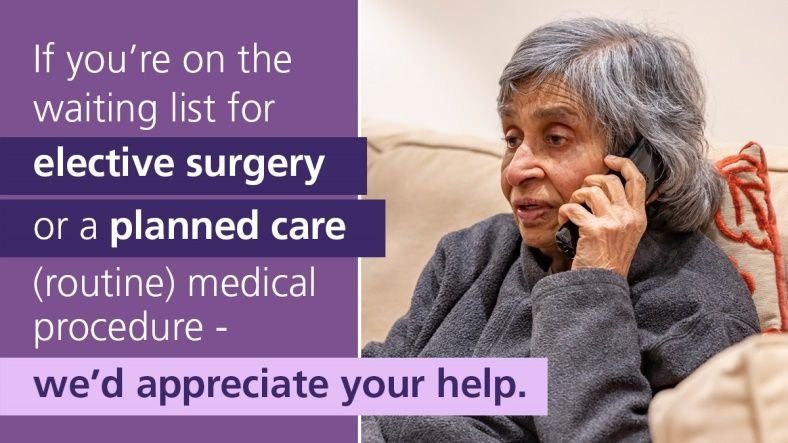 The Partnership’s Planned Care Alliance is looking for local people to join a new citizens’ panel and share their personal experiences of waiting for elective surgery or a planned care (routine) medical procedure. This virtual citizens’ panel of volunteers will support the Alliance with communications around its strategy for restoring planned care services across West Yorkshire and Harrogate.
The Partnership’s Planned Care Alliance is looking for local people to join a new citizens’ panel and share their personal experiences of waiting for elective surgery or a planned care (routine) medical procedure. This virtual citizens’ panel of volunteers will support the Alliance with communications around its strategy for restoring planned care services across West Yorkshire and Harrogate.
The Alliance is looking for adults who are currently on the waiting list for a planned care procedure, or who have a close connection with an adult or child who is waiting, to get involved. The Planned Care Citizens’ Panel will be in place for 12 weeks from 21 June to 10 September 2021, with meetings taking place online every two weeks. The panel will represent people of all age groups, ethnicities, genders and with experience of different health conditions.
Hearing how people have been affected by delays to planned care as a result of the pandemic, how they are managing their symptoms whilst waiting and what activities or support services they are finding helpful will be invaluable as the healthcare system works to restore services and address the backlog.
There’s more information about this new citizens’ panel and how people can apply (by 23 May) on the Planned Care Citizens’ Panel web page.
Unpaid carers programme
The Partnership’s unpaid carers programme board met on Thursday. Co-chaired by Richard Parry Director for Kirklees Council and Karen Johnson, CEO for Locala, members discussed inequalities affecting carers with dementia, the NHS White Paper legislation and young carers. There was also an update from a carer who spoke about the pressures and challenges they face in their caring role. The board also celebrated the Programme’s success at the HSJ’s where the Partnership was highly commended for its work on the West Yorkshire and Harrogate Working Carers Passport.
The work of the programme has been influenced by our response to COVID-19 and recovery with one example being seen in the West Yorkshire Vaccination Programme. This included establishing a carer’s vaccine agreement across West Yorkshire, where local carer’s organisations worked alongside councils and the Partnership to enable all carers to register with their local carer organisation to receive a vaccine – this enabled over 50,000 carers to be reached who would have not come forward. The consequences of carers having COVID-19 have a major impact on those they care for and who rely upon them.
The Partnership launched a new young carers App on the 16 March as part of Young Carers Action Day. The App has been coproduced with young carers following feedback on what support they need to make their caring role easier. Feedback included the importance of virtual anonymous support and advice on how to maintain their physical and mental wellbeing.
Anti-racism movement project group
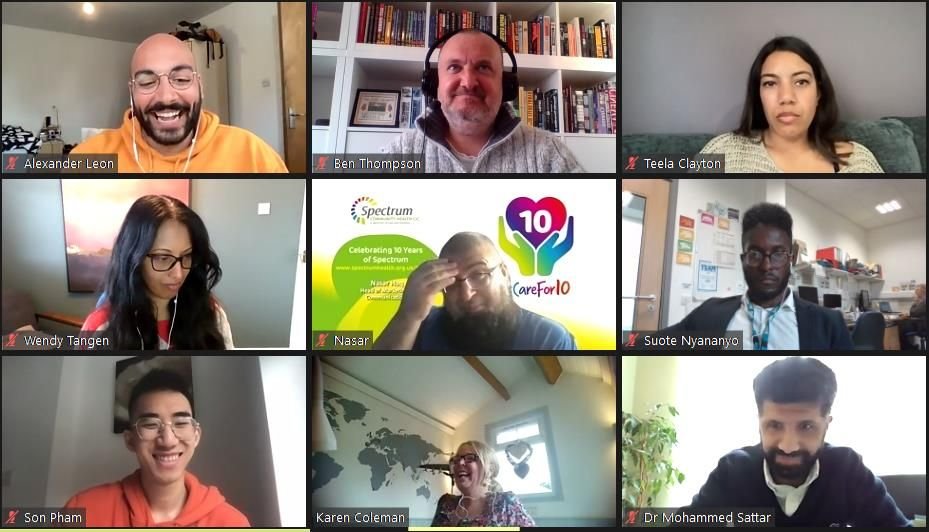 Colleagues from NHS, councils, Healthwatch and voluntary community sector came together on Monday to discuss the development of the Partnership’s anti-racism movement which we hope to launch at the end of summer. There was an update on the focus group sessions which took place last week.
Colleagues from NHS, councils, Healthwatch and voluntary community sector came together on Monday to discuss the development of the Partnership’s anti-racism movement which we hope to launch at the end of summer. There was an update on the focus group sessions which took place last week.
Over 50 colleagues from minority ethnic groups came together to discuss the movement messages, visuals and next steps. Thank you to all who continue get involved.
The Population Health Network
Our Population Health Network met on Tuesday. Members discussed developing integrated systems to deliver the triple aim for organisations to support:
- Better health and wellbeing for everyone
- Better quality of health services for all
- Sustainable use of NHS resources
This included an online learning programme to help people acquire the necessary knowledge and skills and develop organisational capacity and capability to apply these skills.
There was also an update on the West Yorkshire Violence Reduction Unit data hub and progress on data sharing. The aim is to help identify collective hotspots, understand the interventions that we can put in place which are most effective and ultimately prevent serious violence and trauma.
The network meets every two months and is chaired by Tim Ryley, Chief Executive Officer, Leeds CCG. Partnership representatives from public health, clinical commissioning groups, NHS England, foundations trusts, councils and the AHSN attend.
The Partnership’s Future Design and Transition Group
The group includes sector leads, plus clinical commissioning groups accountable officers and leaders responsible for the transformation work streams. The work of the group is supported by a Chairs and Leaders Reference Group which meets monthly. Cllr Tim, Leader of Calderdale Council and Cathy Elliott, chair of Bradford District Care NHS Foundation Trust are the co-chairs. The next meeting is on Friday. Group members discussed development work for a statutory ‘ICS NHS body’ and a separate, Health and Care Partnership, bringing together the NHS, Local Government and partners, if the White Paper proposals for legislation pass through parliament. Pat Keane, from Wakefield Clinical Commissioning Group, will be the leading director for our transition work.
Partnership Mental Health and Wellbeing Summit Event
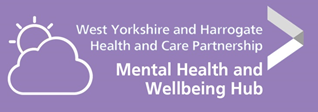 We are pleased to announce that registration for the Partnership’s Mental Health and Wellbeing Summit Event is now open, please click on this link to register your interest. An MS Teams invite will be sent prior to the event.
We are pleased to announce that registration for the Partnership’s Mental Health and Wellbeing Summit Event is now open, please click on this link to register your interest. An MS Teams invite will be sent prior to the event.
Ahead of the event, it would help us if you could share some of your thoughts and current experiences in relation to the development of staff mental health and wellbeing provision and the role of the Hub. Please take five minutes to complete this survey, it will also help us to finalise the agenda for the event and ensure that it aligns with your needs. Survey closes 10 May 2021.
This event will bring together leaders in staff wellbeing from all organisations to ensure we acknowledge and share current and emerging good practice, facilitate conversations which may include varying perspectives to ensure our future focus is right for everyone.
Communication and Engagement Network
Over forty communication and engagement colleagues came together across the area on Thursday from all health and care sectors including NHS, councils, Healthwatch and voluntary and community social enterprise sector. Colleagues received an update on the work of the West Yorkshire Resilience Forum, the Leeds Academic Health Partnership, the Partnership’s new health and wellbeing hub for all staff, as well as an overview on the NHS White Paper for integrated care legislation with a focus on public involvement.
The next network meeting will take place in July. All communication and engagement colleagues are welcome to attend.
Spotting the signs of deconditioning – new resources launched in Bradford District and Craven
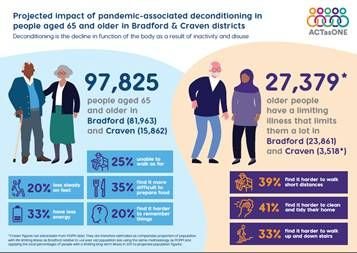 Do you know what deconditioning is and how to recognise if you, your family, friends, patients or clients are at risk? The Act as One Ageing Well programme has been working with partners and our communities to develop a range of resources to help people recognise deconditioning and how they can prevent it or how they can reverse the effects.
Do you know what deconditioning is and how to recognise if you, your family, friends, patients or clients are at risk? The Act as One Ageing Well programme has been working with partners and our communities to develop a range of resources to help people recognise deconditioning and how they can prevent it or how they can reverse the effects.
Deconditioning refers to changes that happen to your body as a result of being inactive or can happen after a period of bed rest. The impact of COVID-19, and a year of living with restrictions has resulted in some older people and people with pre-existing conditions (like COPD or diabetes) becoming increasingly inactive. This means they are likely to experience a loss of ability and confidence. It can also mean that they are at greater risk of falling. It’s important to know that these changes can be prevented and are reversible.
Therapy teams across Bradford District and Craven have been working together to produce a resource which provides useful tips for prevention through keeping active, recognising the signs of deconditioning and useful links for getting support and staying connected. The resource has been adapted from one developed by the Greater Manchester Health and Care Partnership with funding support from our health and care partnership. The digital version of the flyer is available in different languages including Bengali and Urdu and can be accessed on the My Living Well website.
Respiratory restart webinar
Thank you to over 130 people who attended our respiratory restart webinar hosted by Dr Katherine Hickman, our Partnership Lead. The webinar and the presentation slides are available on our the Primary Care programme page on our website.
Professional Records Standards Body
The West Yorkshire and Harrogate Digital Board held on 22 April 2021 approved the proposal for the standard set of data for our organisations to share through the Yorkshire and Humber Care Record. At present there is no conformity in place with organisations who are sharing data with the Yorkshire and Humber Care Record which means that clinicians may expect to see data that is not surfaced by another organisation. The Professional Records Standards Body defines the standard set of information that may be shared between systems providing conformity. For example organisations will share person demographics data as part of the mandatory data set.
Supporting the implementation of gammaCore
Yorkshire & Humber AHSN has been working with various trusts across the region to support the implementation of gammaCore – a device that alleviates the severe and debilitating symptoms of cluster headaches. This video shows how the device has been adopted by Hull University Teaching Hospitals NHS Trust and the difference it’s making to a patient’s quality of life.
So far two trusts in the West Yorkshire and Harrogate region have implemented gammaCore:
- Calderdale and Huddersfield NHS Foundation Trust
- Mid Yorkshire Hospitals NHS Trust.
Veterans’ High Intensity Service in North of England’s new animation
The Veterans’ High Intensity Service in the North of England provides care and treatment for former armed forces personnel (veterans) who are in a mental health crisis and need urgent help.
The High Intensity Service went live in November 2020 and is part of Op COURAGE: The Veterans Mental Health and Wellbeing Service - a new name for the three specialist NHS mental health services for veterans which was launched nationally in March 2021.
In the North of England, the service is being delivered in partnership between the NHS and well-established veterans’ support charities Walking With The Wounded and Combat Stress. Together, they work with local mental health services to provide:
- Support to crisis care services for veterans presenting in a mental health crisis
- Support during an inpatient unit stay – including access to a clinician advice line 24 hours a day, seven days a week
- Care navigation – helping veterans and their carers find the local services best suited to their needs
- Support and care for family members and carers where they need it.
In April, the High Intensity Service in the North launched a short video animation to illustrate what it does and how it works. You can find out more about the High Intensity Service in the North on their website.
Fundraising to help people in India
Pam Bhupal and other Partnership colleagues have set up fundraising page in case anyone would like to help support people living through the pandemic in India. Donations no matter how big or small are welcome if you would like to get involved. Virgin Money Giving | Fundraising |APNA NHS COVID-19 INDIA APPEAL - Help APNA change the world.

